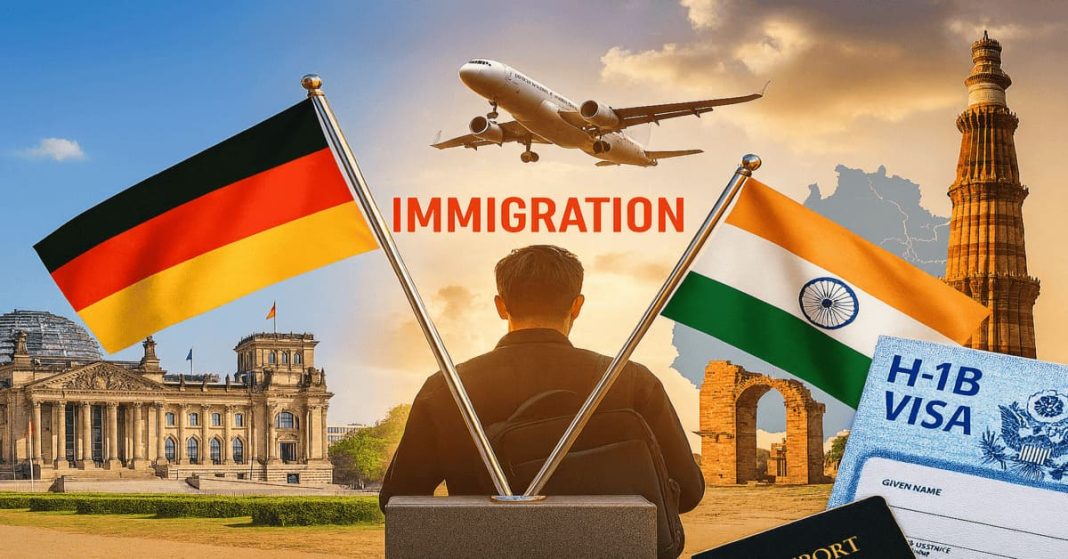German Ambassador to India Dr. Philipp Ackermann extended an invitation to the skilled Indian workers in Germany following President Trump’s H-1B visa move. German Ambassador pitched Germany being the largest economy of Europe as a stable and better alternative to the US.
In a video message posted on a social media platform, German Ambassador Ackermann said that the norms and policies of Germany don’t change overnight. He assured that the Indians of Germany stand out with their stable migrant policies and greater job prospects. In the same video message, he pointed out that the members of the Indian community are among the top earners in Germany. He mentioned that an average Indian earns more than average Germans working in Germany.
With a video on X, Ackermann posted with the caption, “Here is my call to all highly skilled Indians. Germany stands out with its stable migration policies, and with great job opportunities for Indians in IT, management, science and tech.”
“This is a good moment to talk about Indians working in Germany. Indians are among the top earners in Germany. Average Indians earn more than average Germans working in Germany. Because High salary means that Indians are contributing big time to our society and our welfare,” Ackermann explained.
“We believe in hard work, we believe in giving the best work to the best people. Our migration policy works a bit like a German car. It’s reliable, modern, and predictable. We don’t change our rules fundamentally overnight. Highly skilled Indians are welcomed in Germany,” Ackermann added.
US H-1B Visa Fee Hike Sends Shockwaves Across Indian IT Sector
A recent executive order by U.S. President Donald Trump imposing a $100,000 fee on new H-1B visa applications has sent shockwaves through India’s $283 billion information technology sector, which relies heavily on the U.S. market for 57% of its revenue. The policy, effective from September 21, 2025, is forcing Indian IT companies to overhaul long-standing operational models, rethink talent deployment, and brace for potential legal and financial challenges. The move has also triggered a sharp decline in Indian IT stocks and is expected to accelerate the growth of global capability centers (GCCs) in India and beyond.
India has long been the primary beneficiary of the H-1B visa program, securing 71% of approved visas in 2024, far ahead of China at 11.7%. The program has enabled Indian IT firms to send skilled workers to the U.S. for client projects, a practice central to the industry’s onsite-offshore delivery model. However, the steep new fee has made sponsoring new H-1B visas prohibitively expensive, prompting companies to prioritize only critical roles for visa applications. This shift is likely to limit opportunities for many skilled professionals and disrupt the traditional “American Dream” for Indian tech workers.
The policy has already been confused, with some H-1B visa holders rushing back to the U.S. before the rule’s implementation, fearing re-entry restrictions. Clarifications from the White House confirmed that the fee applies only to new applicants, not existing visa holders or renewals, but the initial uncertainty led to significant disruption, including abandoned travel plans for workers from India and China. Mobility of India’s services exports is critical to the services exports to India. This export accounts for half of India’s total trade in goods and services.
India’s foreign ministry believed that such a move could disrupt families, as the beneficiary of the Indian community has been the greatest beneficiary of this H-1B visa. The ministry also added that the US and India have both benefited from the mobility of skilled workers. Amazon has been using the largest number of H-1B visas, where the leading IT services firms are among the top 10 sponsors of the visas. Moreover, the latest amendments in the H-1B visa threaten India’s $280 billion tech services industy.
Here is my call to all highly skilled Indians.
Germany stands out with its stable migration policies, and with great job opportunities for Indians in IT, management, science and tech.
Find your way to Germany to boost your career: https://t.co/u5CmmrHtoF pic.twitter.com/HYiwX2iwME
— Dr Philipp Ackermann (@AmbAckermann) September 23, 2025
Germany’s Political Stability and Progressive Immigration Policies
Chancellor Olaf Scholz of the Social Democratic Party is currently leading the German government. The current government is a collaboration between the Social Democratic Party, Free Democratic Party, and Greens, with a special focus on economic stability, environmental stability, and stable immigration policies. Germany already welcomes highly skilled non-EU workers through its EU Blue Card system. It requires a valid job offer, a salary of at least 45,300 euros, and credible qualifications. Moreover, the Skilled Immigration Act also facilitates the immigration process for skilled workers, which includes vocational training.
Each year, Germany needs hundreds and thousands of foreign skilled workers to support its economy from the impact of an aging population. The UK is also planning to accommodate the global talent by dropping its visa fees. Moreover, the German Foreign Minister is hopeful of a free trade agreement between the EU and India. According to the German Embassy in India, there were around 280,000 Indian nationals living in Germany on permanent residency.
Read more: Trump Blasts China & India for being Primary Funders of Russian War Machine
These programs are aimed at addressing the labour shortages in Germany in various sectors. Currently, Germany is following the migration policies that are stable and predictable, hence offering the foreign skilled and non-skilled workers a highly secure job environment, also allowing the skilled workers permanent residency and family reunification. Germany has long relied on skilled migration to cover up its labour shortages and support its economy. The coalition government titled ‘Responsibility for Germany’ has outlined a balanced view on migration.
The coalition is also emphasizing stricter border controls along with accelerated deportations. However, the coalition does acknowledge the German economy’s need for skilled labour for sustainable growth. This approach, while protecting national interest, also keeps Germany’s door open to global talent. Germany’s stable political environment and transparent immigration policies offer a compelling alternative to foreign IT professionals.














